Ethics in Nursing: Self Advocacy, Professional Accountability Task 2
VerifiedAdded on 2023/06/03
|5
|998
|114
Essay
AI Summary
This essay delves into the complexities of nursing ethics, focusing on self-advocacy and professional accountability within clinical practice. It addresses a scenario involving Mr. Newcomb's request regarding a visit from his mistress, evaluating the situation through ethical principles such as beneficence, nonmaleficence, justice, and autonomy. The essay further examines the influence of personal beliefs and values on ethical decision-making in nursing, particularly concerning honesty and respecting patient autonomy. Finally, it outlines strategies for self-care among nurses, including maintaining boundaries, seeking therapy, and adopting a healthy lifestyle, to mitigate burnout and promote well-being in the demanding oncology unit environment. The essay provides a comprehensive overview of ethical considerations and practical approaches in nursing practice.
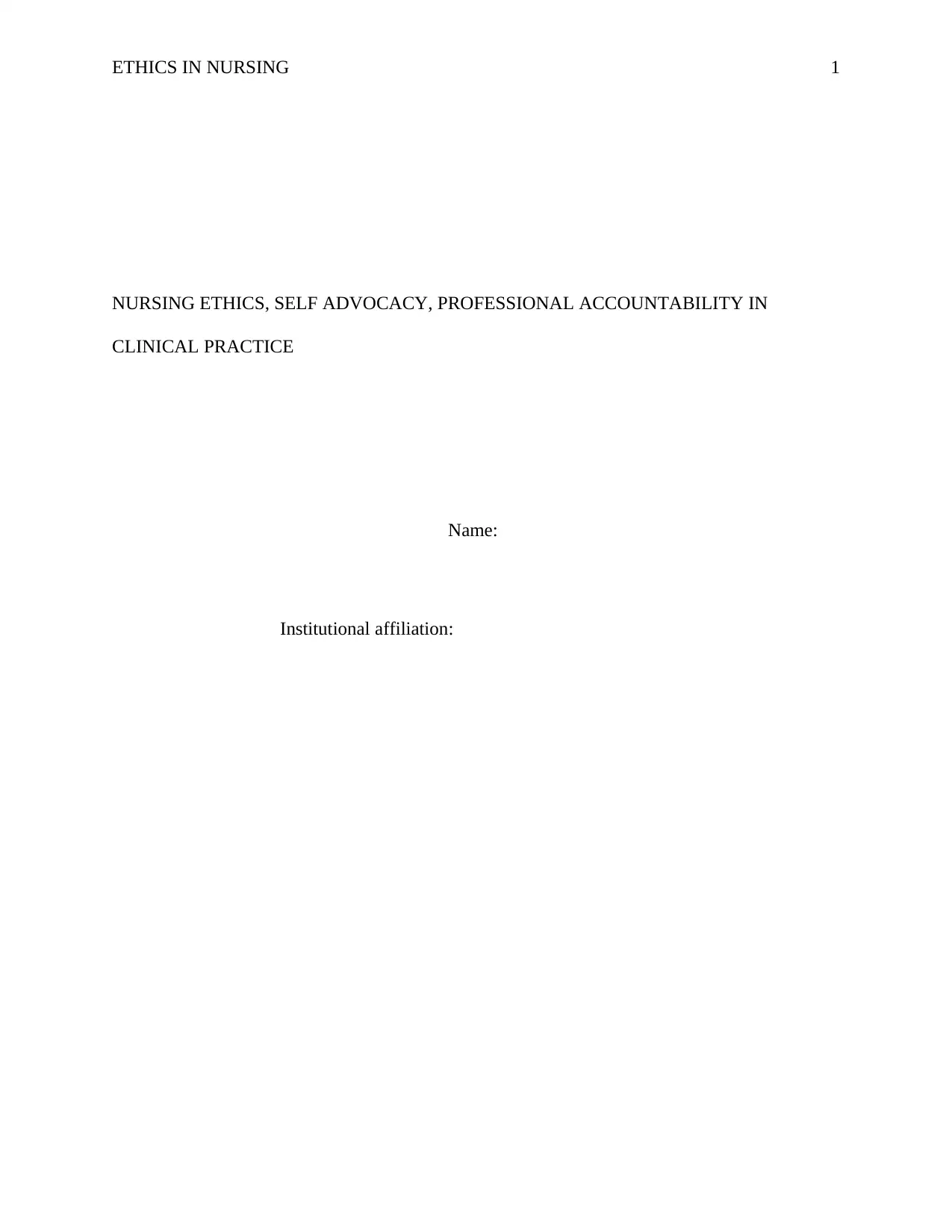
ETHICS IN NURSING 1
NURSING ETHICS, SELF ADVOCACY, PROFESSIONAL ACCOUNTABILITY IN
CLINICAL PRACTICE
Name:
Institutional affiliation:
NURSING ETHICS, SELF ADVOCACY, PROFESSIONAL ACCOUNTABILITY IN
CLINICAL PRACTICE
Name:
Institutional affiliation:
Paraphrase This Document
Need a fresh take? Get an instant paraphrase of this document with our AI Paraphraser
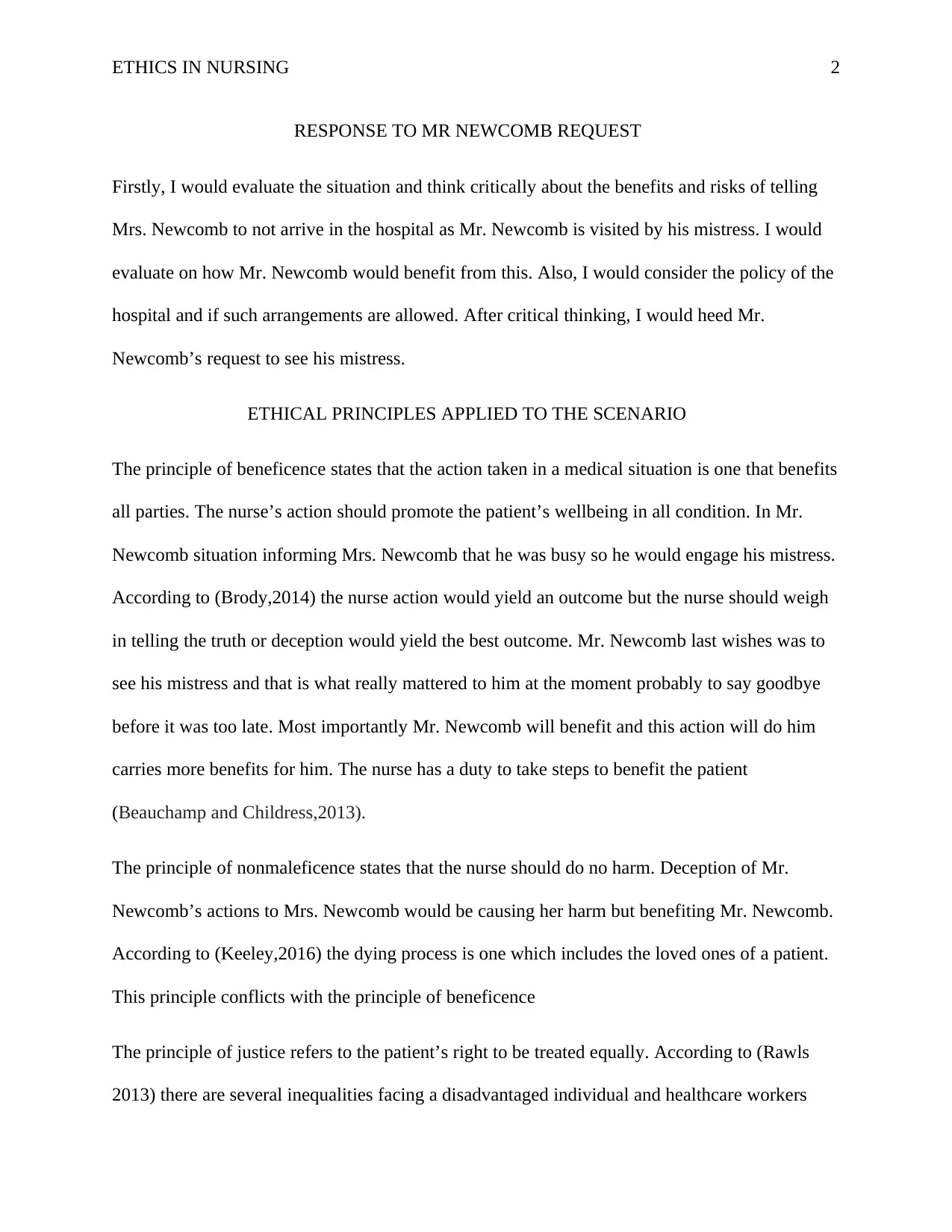
ETHICS IN NURSING 2
RESPONSE TO MR NEWCOMB REQUEST
Firstly, I would evaluate the situation and think critically about the benefits and risks of telling
Mrs. Newcomb to not arrive in the hospital as Mr. Newcomb is visited by his mistress. I would
evaluate on how Mr. Newcomb would benefit from this. Also, I would consider the policy of the
hospital and if such arrangements are allowed. After critical thinking, I would heed Mr.
Newcomb’s request to see his mistress.
ETHICAL PRINCIPLES APPLIED TO THE SCENARIO
The principle of beneficence states that the action taken in a medical situation is one that benefits
all parties. The nurse’s action should promote the patient’s wellbeing in all condition. In Mr.
Newcomb situation informing Mrs. Newcomb that he was busy so he would engage his mistress.
According to (Brody,2014) the nurse action would yield an outcome but the nurse should weigh
in telling the truth or deception would yield the best outcome. Mr. Newcomb last wishes was to
see his mistress and that is what really mattered to him at the moment probably to say goodbye
before it was too late. Most importantly Mr. Newcomb will benefit and this action will do him
carries more benefits for him. The nurse has a duty to take steps to benefit the patient
(Beauchamp and Childress,2013).
The principle of nonmaleficence states that the nurse should do no harm. Deception of Mr.
Newcomb’s actions to Mrs. Newcomb would be causing her harm but benefiting Mr. Newcomb.
According to (Keeley,2016) the dying process is one which includes the loved ones of a patient.
This principle conflicts with the principle of beneficence
The principle of justice refers to the patient’s right to be treated equally. According to (Rawls
2013) there are several inequalities facing a disadvantaged individual and healthcare workers
RESPONSE TO MR NEWCOMB REQUEST
Firstly, I would evaluate the situation and think critically about the benefits and risks of telling
Mrs. Newcomb to not arrive in the hospital as Mr. Newcomb is visited by his mistress. I would
evaluate on how Mr. Newcomb would benefit from this. Also, I would consider the policy of the
hospital and if such arrangements are allowed. After critical thinking, I would heed Mr.
Newcomb’s request to see his mistress.
ETHICAL PRINCIPLES APPLIED TO THE SCENARIO
The principle of beneficence states that the action taken in a medical situation is one that benefits
all parties. The nurse’s action should promote the patient’s wellbeing in all condition. In Mr.
Newcomb situation informing Mrs. Newcomb that he was busy so he would engage his mistress.
According to (Brody,2014) the nurse action would yield an outcome but the nurse should weigh
in telling the truth or deception would yield the best outcome. Mr. Newcomb last wishes was to
see his mistress and that is what really mattered to him at the moment probably to say goodbye
before it was too late. Most importantly Mr. Newcomb will benefit and this action will do him
carries more benefits for him. The nurse has a duty to take steps to benefit the patient
(Beauchamp and Childress,2013).
The principle of nonmaleficence states that the nurse should do no harm. Deception of Mr.
Newcomb’s actions to Mrs. Newcomb would be causing her harm but benefiting Mr. Newcomb.
According to (Keeley,2016) the dying process is one which includes the loved ones of a patient.
This principle conflicts with the principle of beneficence
The principle of justice refers to the patient’s right to be treated equally. According to (Rawls
2013) there are several inequalities facing a disadvantaged individual and healthcare workers
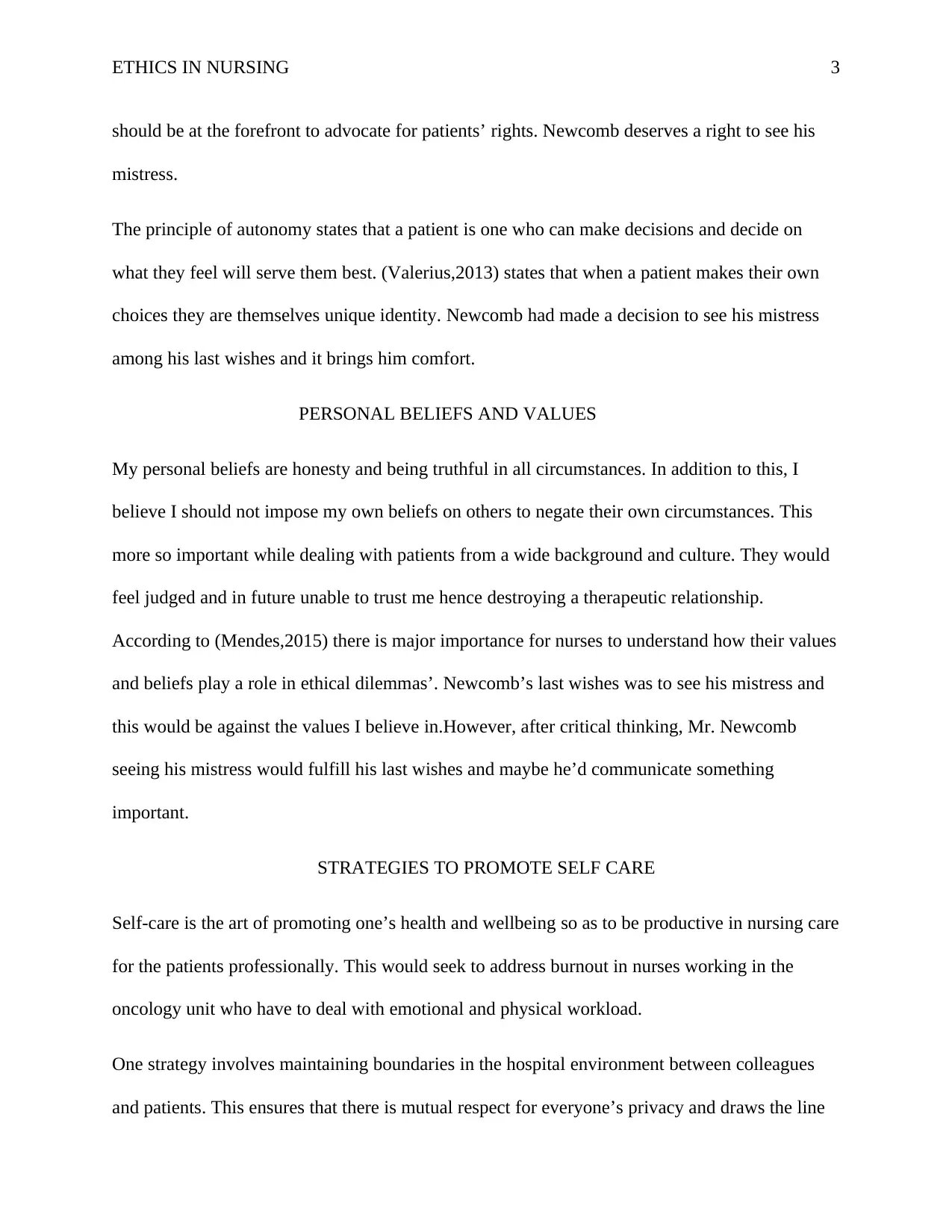
ETHICS IN NURSING 3
should be at the forefront to advocate for patients’ rights. Newcomb deserves a right to see his
mistress.
The principle of autonomy states that a patient is one who can make decisions and decide on
what they feel will serve them best. (Valerius,2013) states that when a patient makes their own
choices they are themselves unique identity. Newcomb had made a decision to see his mistress
among his last wishes and it brings him comfort.
PERSONAL BELIEFS AND VALUES
My personal beliefs are honesty and being truthful in all circumstances. In addition to this, I
believe I should not impose my own beliefs on others to negate their own circumstances. This
more so important while dealing with patients from a wide background and culture. They would
feel judged and in future unable to trust me hence destroying a therapeutic relationship.
According to (Mendes,2015) there is major importance for nurses to understand how their values
and beliefs play a role in ethical dilemmas’. Newcomb’s last wishes was to see his mistress and
this would be against the values I believe in.However, after critical thinking, Mr. Newcomb
seeing his mistress would fulfill his last wishes and maybe he’d communicate something
important.
STRATEGIES TO PROMOTE SELF CARE
Self-care is the art of promoting one’s health and wellbeing so as to be productive in nursing care
for the patients professionally. This would seek to address burnout in nurses working in the
oncology unit who have to deal with emotional and physical workload.
One strategy involves maintaining boundaries in the hospital environment between colleagues
and patients. This ensures that there is mutual respect for everyone’s privacy and draws the line
should be at the forefront to advocate for patients’ rights. Newcomb deserves a right to see his
mistress.
The principle of autonomy states that a patient is one who can make decisions and decide on
what they feel will serve them best. (Valerius,2013) states that when a patient makes their own
choices they are themselves unique identity. Newcomb had made a decision to see his mistress
among his last wishes and it brings him comfort.
PERSONAL BELIEFS AND VALUES
My personal beliefs are honesty and being truthful in all circumstances. In addition to this, I
believe I should not impose my own beliefs on others to negate their own circumstances. This
more so important while dealing with patients from a wide background and culture. They would
feel judged and in future unable to trust me hence destroying a therapeutic relationship.
According to (Mendes,2015) there is major importance for nurses to understand how their values
and beliefs play a role in ethical dilemmas’. Newcomb’s last wishes was to see his mistress and
this would be against the values I believe in.However, after critical thinking, Mr. Newcomb
seeing his mistress would fulfill his last wishes and maybe he’d communicate something
important.
STRATEGIES TO PROMOTE SELF CARE
Self-care is the art of promoting one’s health and wellbeing so as to be productive in nursing care
for the patients professionally. This would seek to address burnout in nurses working in the
oncology unit who have to deal with emotional and physical workload.
One strategy involves maintaining boundaries in the hospital environment between colleagues
and patients. This ensures that there is mutual respect for everyone’s privacy and draws the line
⊘ This is a preview!⊘
Do you want full access?
Subscribe today to unlock all pages.

Trusted by 1+ million students worldwide
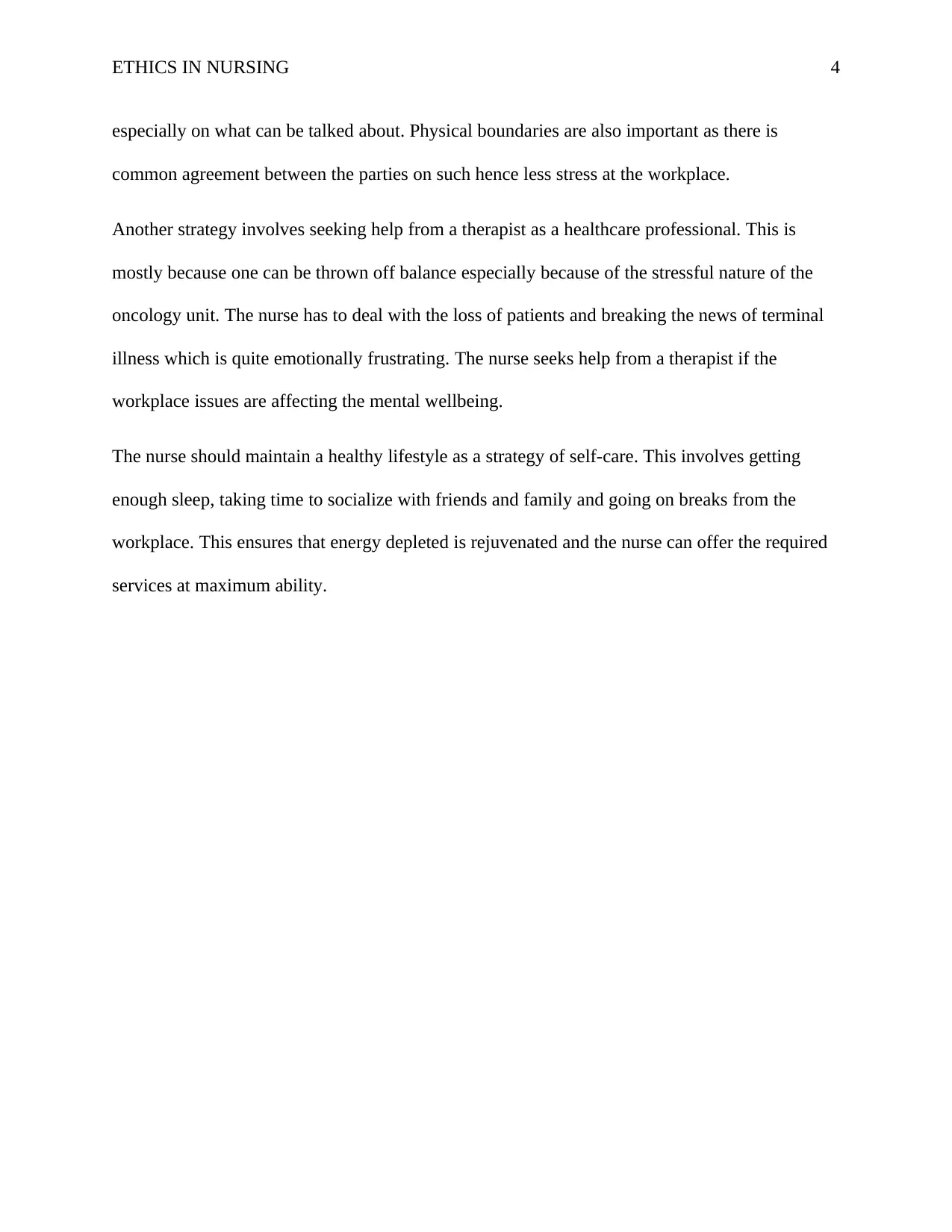
ETHICS IN NURSING 4
especially on what can be talked about. Physical boundaries are also important as there is
common agreement between the parties on such hence less stress at the workplace.
Another strategy involves seeking help from a therapist as a healthcare professional. This is
mostly because one can be thrown off balance especially because of the stressful nature of the
oncology unit. The nurse has to deal with the loss of patients and breaking the news of terminal
illness which is quite emotionally frustrating. The nurse seeks help from a therapist if the
workplace issues are affecting the mental wellbeing.
The nurse should maintain a healthy lifestyle as a strategy of self-care. This involves getting
enough sleep, taking time to socialize with friends and family and going on breaks from the
workplace. This ensures that energy depleted is rejuvenated and the nurse can offer the required
services at maximum ability.
especially on what can be talked about. Physical boundaries are also important as there is
common agreement between the parties on such hence less stress at the workplace.
Another strategy involves seeking help from a therapist as a healthcare professional. This is
mostly because one can be thrown off balance especially because of the stressful nature of the
oncology unit. The nurse has to deal with the loss of patients and breaking the news of terminal
illness which is quite emotionally frustrating. The nurse seeks help from a therapist if the
workplace issues are affecting the mental wellbeing.
The nurse should maintain a healthy lifestyle as a strategy of self-care. This involves getting
enough sleep, taking time to socialize with friends and family and going on breaks from the
workplace. This ensures that energy depleted is rejuvenated and the nurse can offer the required
services at maximum ability.
Paraphrase This Document
Need a fresh take? Get an instant paraphrase of this document with our AI Paraphraser
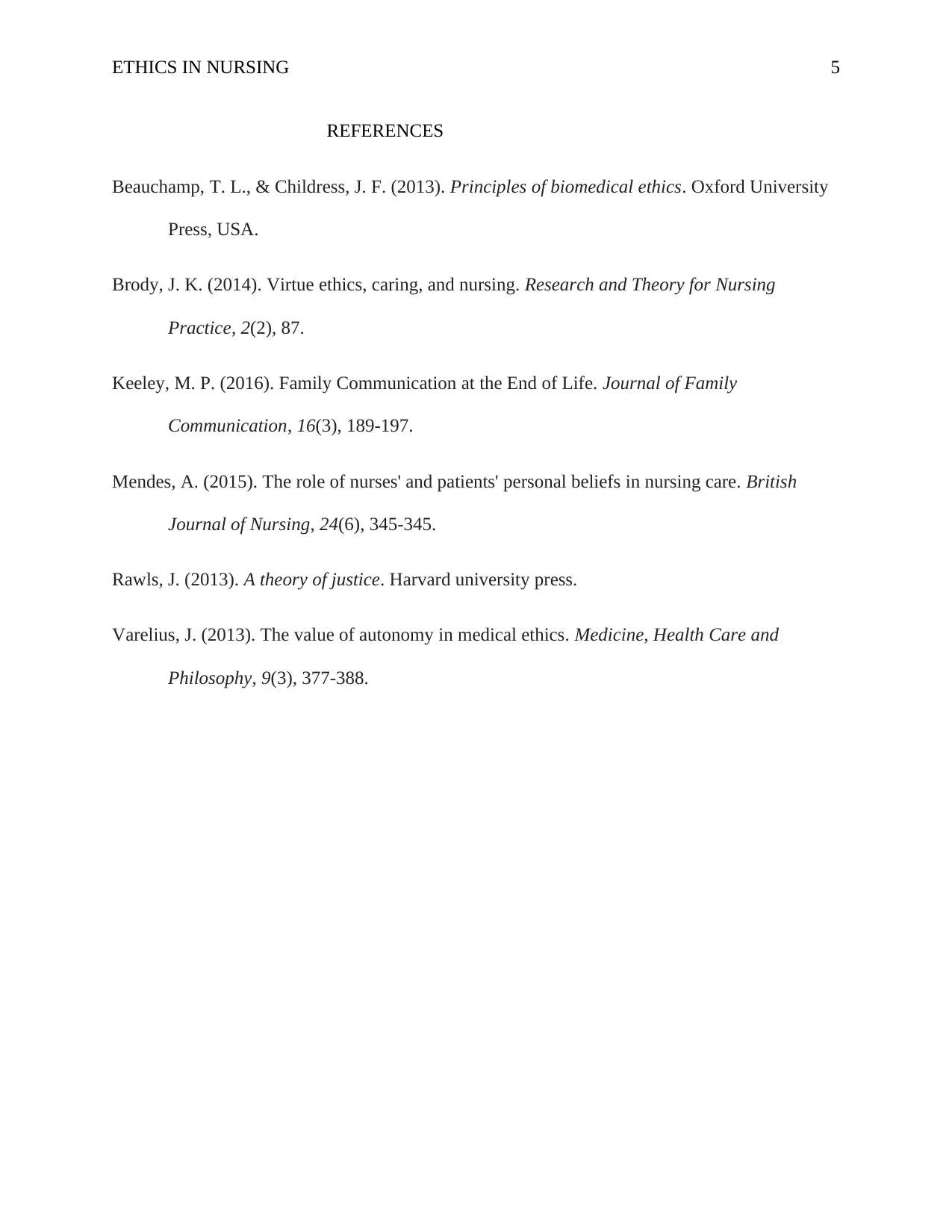
ETHICS IN NURSING 5
REFERENCES
Beauchamp, T. L., & Childress, J. F. (2013). Principles of biomedical ethics. Oxford University
Press, USA.
Brody, J. K. (2014). Virtue ethics, caring, and nursing. Research and Theory for Nursing
Practice, 2(2), 87.
Keeley, M. P. (2016). Family Communication at the End of Life. Journal of Family
Communication, 16(3), 189-197.
Mendes, A. (2015). The role of nurses' and patients' personal beliefs in nursing care. British
Journal of Nursing, 24(6), 345-345.
Rawls, J. (2013). A theory of justice. Harvard university press.
Varelius, J. (2013). The value of autonomy in medical ethics. Medicine, Health Care and
Philosophy, 9(3), 377-388.
REFERENCES
Beauchamp, T. L., & Childress, J. F. (2013). Principles of biomedical ethics. Oxford University
Press, USA.
Brody, J. K. (2014). Virtue ethics, caring, and nursing. Research and Theory for Nursing
Practice, 2(2), 87.
Keeley, M. P. (2016). Family Communication at the End of Life. Journal of Family
Communication, 16(3), 189-197.
Mendes, A. (2015). The role of nurses' and patients' personal beliefs in nursing care. British
Journal of Nursing, 24(6), 345-345.
Rawls, J. (2013). A theory of justice. Harvard university press.
Varelius, J. (2013). The value of autonomy in medical ethics. Medicine, Health Care and
Philosophy, 9(3), 377-388.
1 out of 5
Related Documents
Your All-in-One AI-Powered Toolkit for Academic Success.
+13062052269
info@desklib.com
Available 24*7 on WhatsApp / Email
![[object Object]](/_next/static/media/star-bottom.7253800d.svg)
Unlock your academic potential
Copyright © 2020–2026 A2Z Services. All Rights Reserved. Developed and managed by ZUCOL.





